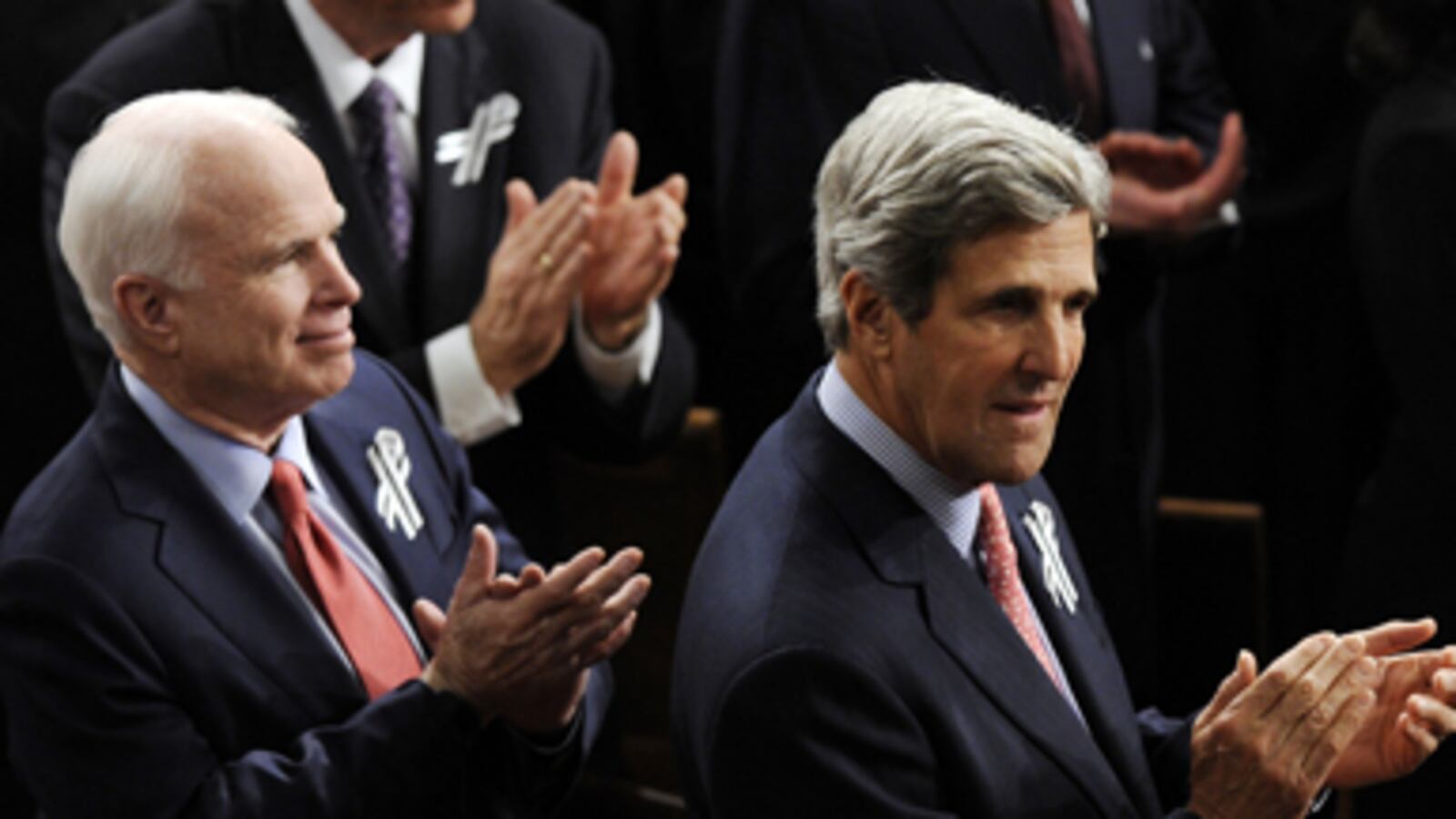“It is political theater at bottom,” a presidential historian told Politico the other day. He was talking about the annual State of the Union address, and he wasn’t being kind. Political theater, in this context, means shallow spectacle, an event that doesn’t have much weight. But sometimes spectacle can mean a great deal, particularly when the speaker is as compelling as President Obama was Tuesday night—and the room is as weird.

For the most part, Obama seemed content to sound like the country’s Rotarian-in-chief. America, he said, is “the nation of Edison and the Wright brothers; of Google and Facebook.” Our inventiveness and drive have made America “not just a place on a map, but a light to the world.” These sentiments, plus his mantra for the evening—that through smart investments, new ideas, and strong leadership, we must “win the future”— were succinct, sunny, Reaganite.
Obama’s decision to strike such a tone wouldn’t have surprised you, had you been watching the cable-news coverage leading up to the speech. His text was quoted, its omissions criticized, and its possible ramifications weighed by one talking head after another for hours. (Every year, the coverage of big speeches like this one looks more and more like the coverage of the NFL: the excitable pregame chatter, the oversized countdown clocks, the bold predictions about which side will win. I dream of a day when the respective broadcast teams will switch jobs.) Since the crucial points of the speech had been aired already, the real interest lay in the delivery—and, just as important, in its reception.
• Watch the 7 Best SOTU Moments • More SOTU reactionsThe pundits called it “Prom Night” because some Republicans and Democrats decided to break with tradition and sit side by side instead of in partywide blocs. It was charming to see some odd couples onscreen, like John Kerry and John McCain, but the more important effect—particularly for a TV audience that may not have the Congressional Facebook committed to memory—was the change in the pattern of applause we’ve come to expect. For once, our legislative leaders didn’t use the president’s address as a chance to perform a mangled version of the wave, where half the room stands and cheers while the other half sulks (and then, a few minutes later, vice-versa). Strange combinations of people stood and applauded throughout the president’s speech—and at some strange places. A line that looked like sure-fire ovation bait on the page (“Tonight we can say that American leadership has been renewed and America's standing has been restored”) didn’t draw a clap. Meanwhile, the sentiment that “it's not just the winner of the Super Bowl who deserves to be celebrated, but the winner of the science fair” had the whole room up and yelling. It looked like “Prom Night,” all right—not because people were in pairs, but because they looked unsure of themselves and scared of doing something embarrassing.
Whether it was savvy planning or luck, the end of Obama’s speech hit just the right tone for this discombobulated scene. It won’t be easy to win the future, he acknowledged. “We will argue about everything… And yet, as contentious and frustrating and messy as our democracy can sometimes be, I know there isn't a person here who would trade places with any other nation on Earth.” It seemed to echo a line earlier in the speech, when he talked about “the American family” and how all of us, including American Muslims, belong to it. Because there was something familial about all the branches of our federal government cramming onto the House floor not in their usual regimented fashion but in a newly topsy-turvy way. In that generous frame of mind, it was easier to appreciate Speaker John Boehner having a healthy walnut hue, or Joe Biden loving every gleeful second of being up on the dais, and relishing the story about the Pennsylvania miner who helped in the Chile rescue, and beaming when Obama talked about a kid from Scranton who grew up to become vice president, but making sure to frown at all the sad parts.
You knew, watching the speech, that in the postgame show, the pundits would be back to pinpointing every possible source of partisan friction, and the official responses from the Republicans and the Tea Party would be pungent. Still, however briefly, a canny speech and an unusual seating chart offered a glimpse of a different, jumbled, and generally more human government than the one we normally see. Even if just for an hour, it looked like Obama had done what the voters sent him to Washington to do.
Jeremy McCarter is a senior writer at Newsweek.






